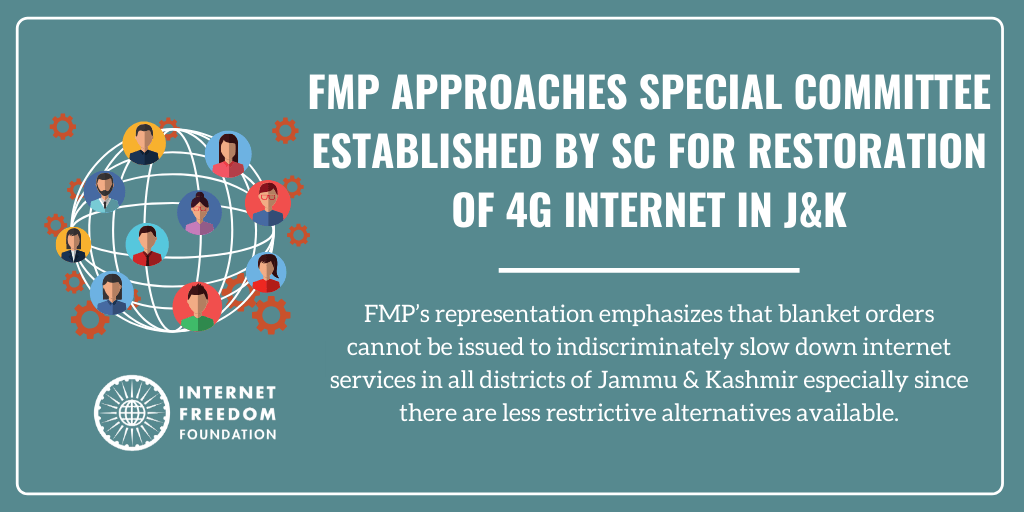
Tl;dr
On 16.05.2020, Foundation for Media Professionals wrote to the Special Committee established by the Supreme Court to decide the issue of restoration of 4G internet services in Jammu & Kashmir. In its representation, FMP has urged the Special Committee to pay heed to the Supreme Court's holding that internet restrictions are proportionate only if they are geographically and temporally limited. Therefore, blanket orders cannot be issued which indiscriminately slow down internet services in all districts of Jammu & Kashmir without providing specific reasons for each district. In addition to this, the representation reiterated FMP's submissions made before the Supreme Court about unsuitability of internet restrictions as a tool to address terrorism and suggested that there were several less restrictive alternatives available to the government such as blocking specific websites or restricting internet access for a limited period in a limited area to tackle the threat of terrorism.
Timeline of Events
Foundation for Media Professionals (FMP) had filed a petition before the Supreme Court seeking restoration of 4G internet services in Jammu & Kashmir on 31.03.2020. The petition highlighted how slowdown of internet services in the region had deprived the people of their right to access healthcare, education, livelihood, justice and information during the COVID-19 pandemic (Read more about the petition here).
To concretely demonstrate the impact of the restrictions, the Director of FMP- Ms. Revati Laul collected personal testimonies of doctors, students, teachers, businesspersons, lawyers and journalists in Jammu & Kashmir about the hardships being faced by them due to lack of effective internet. The petitioners also filed an affidavit authored by Mr. Prateek Waghre which provided a technical analysis of web performance at 2G v. 4G speed and revealed that video facilities and important resources like WHO's Situation Tracker did not function at 2G speed. (Read more about these affidavits here).
The matter was substantively heard by the Supreme Court on 04.05.2020 and the Court reserved its order in the matter on the same day. During the oral hearing and in its counter-affidavit, the government repeatedly cited the threat of terrorists using the internet to conduct their operations, recruit new members and spread propaganda as a justification for the restrictions on internet speed. However, the petitioners challenged this narrative through empirical studies and the government's own data which showed there was no rational connection between internet access and rise in terrorism (Read more about the court hearing here).
On 11.05.2020, the Supreme Court pronounced its verdict in the matter and it constituted a Special Committee consisting of (i) Secretary, Ministry of Home Affairs, (ii) Secretary, Department of Telelcom and (iii) Chief Secretary, U.T. of Jammu & Kashmir to decide whether the internet slowdown in Jammu & Kashmir was necessary and proportionate after balancing competing concerns of terrorism and human rights. The Committee was also required to consider alternatives suggested by the petitioners including restoration of high speed internet in some districts on a trial basis (Read more about the judgement here).
Special Committee must restore 4G
On 16.05.2020, FMP wrote to all members of the Special Committee seeking restoration of 4G internet services in Jammu & Kashmir. In its representation, FMP laid emphasis on the Supreme Court's observation that previous orders issued by the government under the Telecom Suspension Rules had imposed restrictions across all districts of Jammu & Kashmir without providing any specific reasons for each district. The representation also highlighted the Supreme Court's holding that internet restrictions are proportionate only if they are geographically and temporally limited. Therefore, blanket orders cannot be issued which indiscriminately slow down internet services in all districts of Jammu & Kashmir without providing district specific reasons.
In addition to this, the recent representation reiterated FMP's submissions made before the Supreme Court about unsuitability of internet restrictions as a tool to address terrorism and pointed out that terrorist activities had increased in Jammu & Kashmir during the two weeks preceeding the most recent order dated 11.05.2020 despite severe internet restrictions being in place. Finally, the representation suggested that there were several less restrictive alternatives available to the government such as blocking specific websites or restricting internet access for a limited period in a limited area to tackle the threat of terrorism.
IFF provided drafting assistance for this representation to the Special Committee. IFF retained counsels have also provided legal representation to FMP in the recent petition regarding internet slowdown in Jammu & Kashmir during the COVID-19 pandemic and the previous challenge against the communication shutdown imposed in the region after abrogation of Article 370. Along with FMP, we remain fully committed to restoration of 4G internet services in Jammu & Kashmir and this representation is another incremental step towards achieving this goal which will require public advocacy, legislative reform and follow up litigation in the long term.
Important Documents
- Representation from FMP to Special Committee (link)
